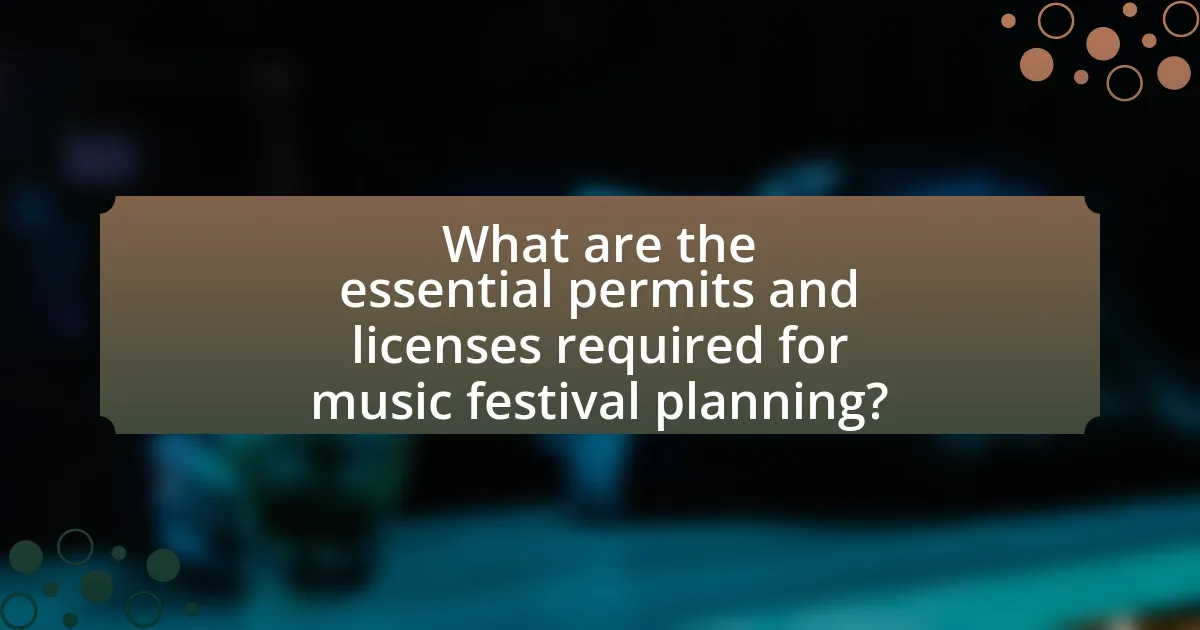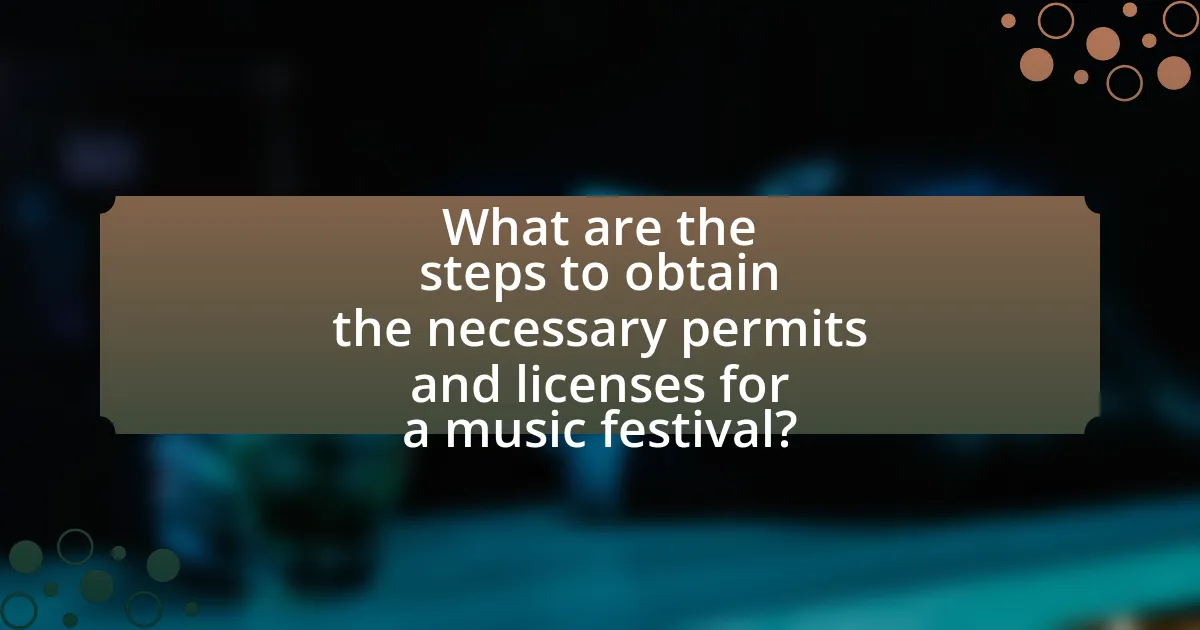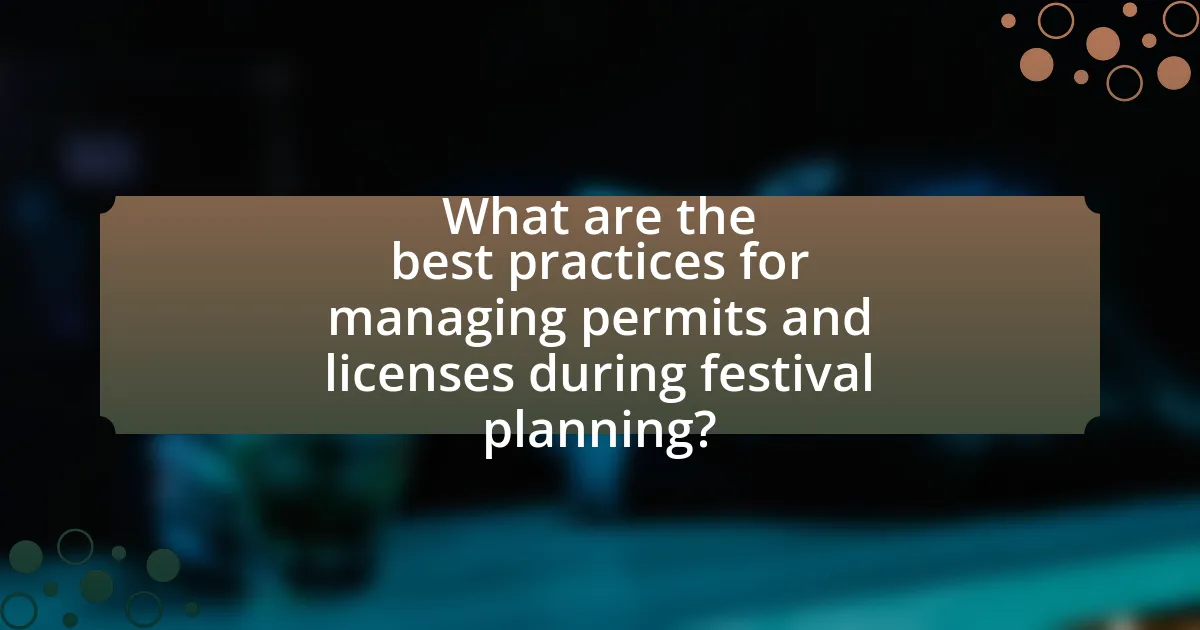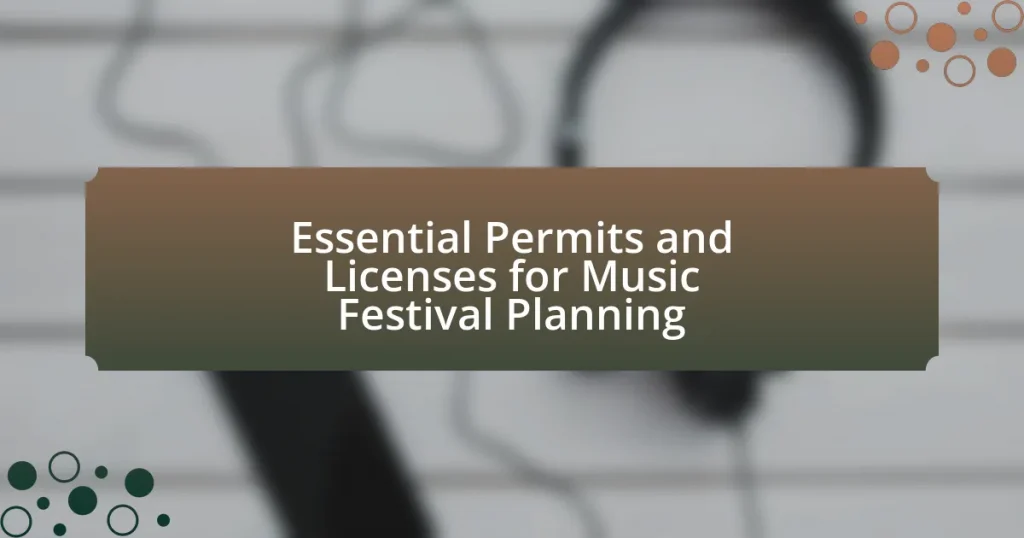The article focuses on the essential permits and licenses required for planning a music festival, highlighting the importance of legal compliance for safety and successful event execution. Key permits discussed include special event permits, noise permits, health and safety permits, and alcohol licenses, each serving specific regulatory purposes. The article outlines the legal implications of failing to secure these permits, the steps involved in obtaining them, and best practices for managing the application process. Additionally, it emphasizes the role of local regulations and effective communication with authorities in navigating the permitting landscape.

What are the essential permits and licenses required for music festival planning?
The essential permits and licenses required for music festival planning include a special event permit, noise permit, health and safety permits, and alcohol license. A special event permit is typically required from local authorities to legally hold the festival at a specific location. A noise permit may be necessary to comply with local sound ordinances, especially if the festival will feature loud music. Health and safety permits ensure that the event meets public health standards, including food safety and crowd management. An alcohol license is required if the festival plans to sell or serve alcoholic beverages, which is regulated by state and local laws. These permits and licenses are crucial for legal compliance and to ensure the safety and enjoyment of attendees.
Why are permits and licenses crucial for music festivals?
Permits and licenses are crucial for music festivals because they ensure compliance with local laws and regulations, which is essential for the safety and legality of the event. These legal requirements help manage crowd control, noise levels, and health regulations, thereby minimizing risks associated with large gatherings. For instance, obtaining a public assembly permit is often necessary to legally host a large crowd, while health permits ensure that food vendors meet safety standards. Additionally, failure to secure the appropriate permits can result in fines, event cancellation, or legal action, as evidenced by numerous cases where festivals faced shutdowns due to non-compliance.
What legal implications arise from not obtaining necessary permits?
Not obtaining necessary permits can lead to significant legal implications, including fines, penalties, and potential shutdowns of events. Local governments enforce regulations that require permits for safety, zoning, and health compliance; failure to secure these permits can result in legal action against the event organizers. For instance, in 2019, a music festival in California faced a $100,000 fine for operating without the required permits, illustrating the financial risks involved. Additionally, organizers may be held liable for any accidents or injuries that occur due to non-compliance with safety regulations, further compounding legal liabilities.
How do permits and licenses ensure safety at music festivals?
Permits and licenses ensure safety at music festivals by establishing regulatory standards that organizers must follow. These legal requirements often include safety protocols for crowd management, emergency medical services, and structural integrity of stages and equipment. For instance, local authorities may mandate fire safety inspections and crowd control measures, which are critical for preventing accidents and ensuring a safe environment for attendees. Additionally, permits often require the presence of trained security personnel and medical staff, which further enhances safety. Compliance with these regulations is monitored by government agencies, ensuring that festivals adhere to established safety guidelines, thereby reducing risks associated with large gatherings.
What types of permits are typically needed for music festivals?
Music festivals typically require several types of permits, including a special event permit, noise permit, alcohol permit, health and safety permits, and vendor permits. The special event permit is essential for legally hosting the festival in a designated area, while the noise permit ensures compliance with local sound regulations. An alcohol permit is necessary if the festival plans to serve or sell alcoholic beverages. Health and safety permits are required to meet sanitation and safety standards, and vendor permits are needed for any food or merchandise vendors participating in the event. These permits are crucial for legal compliance and successful festival operation.
What is a special event permit and why is it important?
A special event permit is an official authorization required to host events that may impact public spaces, safety, or local regulations. This permit is important because it ensures compliance with local laws, facilitates necessary safety measures, and helps manage public resources effectively. For instance, many municipalities require this permit for events like music festivals to address concerns related to crowd control, noise levels, and sanitation, thereby protecting both the attendees and the community.
How does a noise permit affect festival planning?
A noise permit directly impacts festival planning by legally allowing organizers to exceed standard noise levels during the event. This permit ensures compliance with local noise regulations, which can vary significantly by location. Without obtaining a noise permit, festival planners risk fines, legal action, or event cancellation due to noise complaints from nearby residents or businesses. For instance, cities like Los Angeles require noise permits for outdoor events to manage sound levels and maintain community relations, emphasizing the necessity of this permit in the planning process.
What role does a health permit play in music festival organization?
A health permit is crucial in music festival organization as it ensures compliance with health and safety regulations. This permit verifies that the festival meets local health standards, including food safety, sanitation, and crowd management, which are essential for protecting attendees’ well-being. For instance, many jurisdictions require health permits to prevent foodborne illnesses and ensure that medical services are available on-site. Failure to obtain a health permit can result in fines, legal issues, or even the cancellation of the event, highlighting its importance in the planning process.
How do local regulations impact the permits required for music festivals?
Local regulations significantly influence the permits required for music festivals by establishing specific legal requirements that organizers must adhere to. These regulations can dictate the types of permits needed, such as noise permits, health and safety permits, and alcohol licenses, which vary by jurisdiction. For instance, in many cities, noise ordinances may limit sound levels and hours of operation, necessitating a noise permit to comply with local laws. Additionally, health regulations may require permits for food vendors, ensuring compliance with safety standards. Local zoning laws can also affect where festivals can be held, impacting the overall planning process. Therefore, understanding and navigating these local regulations is crucial for festival organizers to ensure compliance and avoid legal issues.
What factors should be considered when researching local laws?
When researching local laws for music festival planning, key factors include jurisdictional regulations, zoning laws, noise ordinances, and health and safety codes. Jurisdictional regulations determine which local government entities have authority over permits and licenses, while zoning laws dictate where events can be held. Noise ordinances set limits on sound levels during specific hours, impacting festival operations. Health and safety codes ensure compliance with public safety standards, including crowd management and sanitation requirements. Understanding these factors is crucial for legal compliance and successful event execution.
How can festival planners navigate varying regulations across locations?
Festival planners can navigate varying regulations across locations by conducting thorough research on local laws and engaging with local authorities. Understanding specific requirements such as permits, noise ordinances, and safety regulations is crucial, as these can differ significantly from one jurisdiction to another. For instance, a study by the National Association of Festivals highlights that compliance with local regulations can reduce legal risks and enhance community relations, demonstrating the importance of proactive engagement with local government and stakeholders.

What are the steps to obtain the necessary permits and licenses for a music festival?
To obtain the necessary permits and licenses for a music festival, follow these steps: First, identify the specific permits required by local, state, and federal authorities, which typically include a special event permit, noise permit, and health permits. Next, gather all required documentation, such as proof of insurance, site plans, and artist contracts. After that, submit the applications to the relevant authorities, ensuring compliance with deadlines and regulations. Finally, pay any associated fees and follow up with the authorities to confirm the status of your applications. These steps are essential as they ensure legal compliance and the safety of attendees, which is critical for successful event execution.
How can festival organizers prepare for the permit application process?
Festival organizers can prepare for the permit application process by thoroughly researching local regulations and requirements specific to their event. This preparation involves identifying the necessary permits, such as those for noise, health, safety, and alcohol sales, which vary by location and type of festival. Additionally, organizers should engage with local authorities early in the planning stage to clarify any specific documentation or fees required, as well as to understand timelines for submission and approval. According to the National Association of Festivals, timely communication with city officials can significantly streamline the permitting process, reducing the risk of delays or rejections.
What documentation is typically required for permit applications?
Permit applications typically require documentation such as a completed application form, proof of ownership or lease of the venue, site plans, and insurance certificates. These documents ensure compliance with local regulations and demonstrate the applicant’s preparedness for the event. For instance, a site plan outlines the layout of the festival, while insurance certificates provide liability coverage, which is often mandated by local authorities.
How long does the permit approval process usually take?
The permit approval process usually takes between 30 to 90 days. This timeframe can vary based on the type of permit required, the complexity of the event, and the specific regulations of the local jurisdiction. For instance, larger events may require more extensive reviews, leading to longer approval times. Additionally, some municipalities may have expedited processes for certain permits, while others may experience delays due to high application volumes or incomplete submissions.
What challenges might arise during the permit application process?
Challenges during the permit application process for music festivals include navigating complex regulations, meeting varying local government requirements, and potential delays in approval. Regulatory complexity arises from differing laws across jurisdictions, which can lead to confusion and misinterpretation. Local government requirements may include specific documentation, public safety plans, and environmental assessments, which can be time-consuming to compile. Delays in approval can occur due to bureaucratic inefficiencies or the need for additional information, potentially impacting festival timelines. These challenges can hinder the planning process and require careful management to ensure compliance and timely execution.
How can organizers address potential objections from local authorities?
Organizers can address potential objections from local authorities by proactively engaging in dialogue and demonstrating compliance with regulations. This involves presenting a comprehensive event plan that outlines safety measures, traffic management, noise control, and community impact assessments. For instance, studies show that festivals that include local stakeholders in planning processes experience fewer objections, as seen in the 2019 analysis by the University of California, which highlighted the importance of community involvement in event planning. By providing data on expected attendance, economic benefits, and environmental considerations, organizers can effectively mitigate concerns and foster a collaborative relationship with local authorities.
What are common mistakes to avoid when applying for permits?
Common mistakes to avoid when applying for permits include submitting incomplete applications, failing to meet deadlines, and not understanding local regulations. Incomplete applications can lead to delays or rejections, as authorities require specific information to process permits effectively. Missing deadlines can result in lost opportunities, as many permits have strict timelines for submission. Additionally, not understanding local regulations can lead to non-compliance, which may incur fines or permit denials. For instance, a study by the National Association of Counties highlights that 30% of permit applications are rejected due to insufficient information or failure to adhere to local codes.

What are the best practices for managing permits and licenses during festival planning?
The best practices for managing permits and licenses during festival planning include early identification of required permits, thorough documentation, and proactive communication with local authorities. Early identification ensures that all necessary permits, such as those for noise, health, and safety, are recognized well in advance, allowing ample time for application and approval. Thorough documentation involves maintaining organized records of all applications, approvals, and correspondence, which aids in tracking progress and compliance. Proactive communication with local authorities fosters good relationships and can expedite the permitting process, as well as ensure adherence to local regulations. These practices are essential for minimizing delays and ensuring a successful festival.
How can effective communication with local authorities facilitate the process?
Effective communication with local authorities can streamline the permitting process for music festivals by ensuring clarity and alignment on requirements. When organizers engage in open dialogue with local officials, they can quickly address concerns, clarify regulations, and receive timely feedback, which reduces delays. For instance, a study by the National Association of Counties found that proactive communication can decrease permit processing times by up to 30%. This efficiency not only helps in meeting deadlines but also fosters a collaborative relationship that can lead to smoother event execution and compliance with local laws.
What strategies can be employed to ensure compliance with regulations?
To ensure compliance with regulations in music festival planning, organizations can implement a comprehensive compliance management system. This system should include regular training for staff on relevant laws and regulations, thorough documentation of all permits and licenses, and ongoing audits to assess adherence to compliance standards. For instance, the National Association of State Boards of Accountancy emphasizes the importance of maintaining accurate records and conducting periodic reviews to identify potential compliance gaps. Additionally, engaging legal experts familiar with local regulations can provide tailored guidance, ensuring that all aspects of the festival meet legal requirements.
How can festival planners keep track of permit deadlines and requirements?
Festival planners can keep track of permit deadlines and requirements by utilizing project management software and creating a detailed timeline. This approach allows planners to set reminders for each permit’s application date and renewal deadlines, ensuring compliance with local regulations. For instance, tools like Asana or Trello can help organize tasks and deadlines visually, while checklists can ensure all necessary documents are prepared in advance. Additionally, maintaining regular communication with local authorities can provide updates on any changes in permit requirements, further aiding in effective tracking.
What resources are available to assist in the permit and license process?
Resources available to assist in the permit and license process for music festival planning include government websites, local regulatory agencies, and industry associations. Government websites often provide comprehensive guidelines and application forms specific to permits and licenses required for events. Local regulatory agencies, such as city or county offices, can offer direct assistance and clarification on local laws and requirements. Additionally, industry associations, like the National Association of Music Festivals, provide resources, networking opportunities, and best practices that can help streamline the permitting process. These resources are essential for ensuring compliance and successful event planning.
How can industry associations support festival planners in obtaining permits?
Industry associations can support festival planners in obtaining permits by providing resources, guidance, and advocacy. These associations often have established relationships with local government agencies, which can facilitate smoother communication and expedite the permitting process. For example, they may offer templates for permit applications, share best practices for compliance with regulations, and provide training on navigating the legal requirements specific to festival planning. Additionally, industry associations can advocate on behalf of festival planners to influence policy changes that simplify the permitting process, as seen in various regions where associations have successfully lobbied for streamlined regulations.
What online tools can help streamline the permit application process?
Online tools that can help streamline the permit application process include platforms like ePermits, PermitHub, and GovPilot. ePermits allows users to submit applications electronically, track their status, and receive notifications, which enhances efficiency. PermitHub centralizes various permit applications and provides a user-friendly interface for managing submissions. GovPilot offers a comprehensive solution for municipalities to manage permits digitally, reducing paperwork and processing time. These tools collectively improve the speed and organization of the permit application process, facilitating smoother planning for events like music festivals.
What are the key takeaways for successfully navigating permits and licenses in music festival planning?
Successfully navigating permits and licenses in music festival planning requires thorough research, early application, and clear communication with local authorities. Researching the specific permits needed, such as noise permits, health permits, and occupancy permits, is crucial as requirements vary by location. Early application is essential because processing times can be lengthy, and many permits require public notice periods. Clear communication with local authorities ensures compliance with regulations and helps address any concerns proactively. For instance, according to the National Association of Music Merchants, festivals that engage with local governments early in the planning process experience fewer delays and complications.
